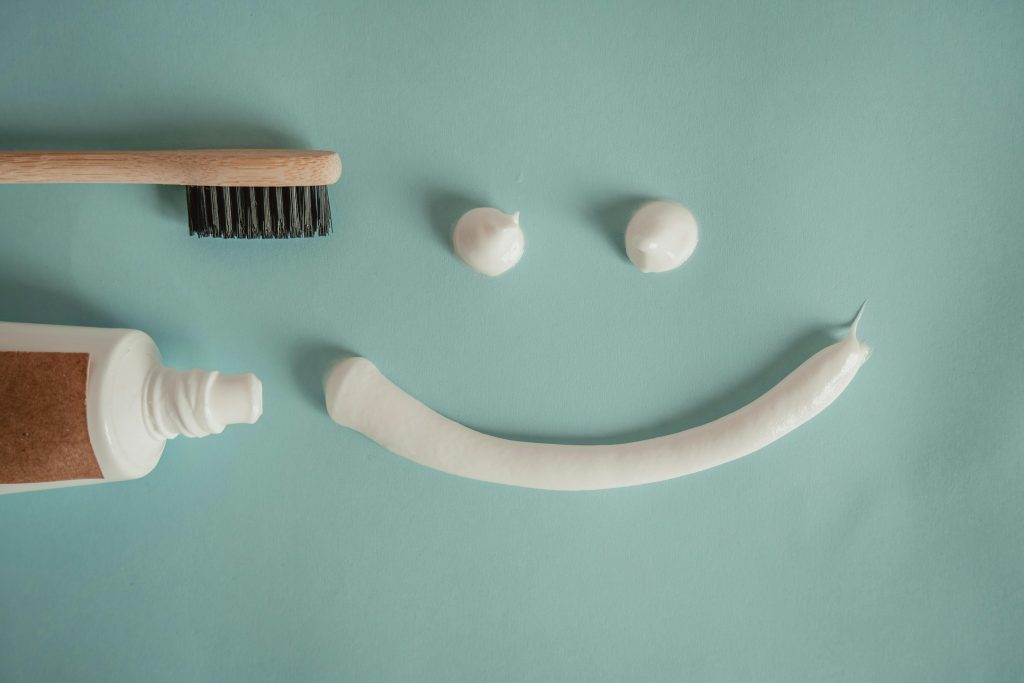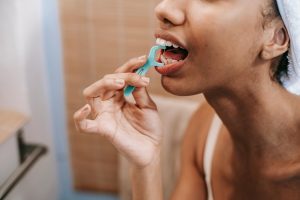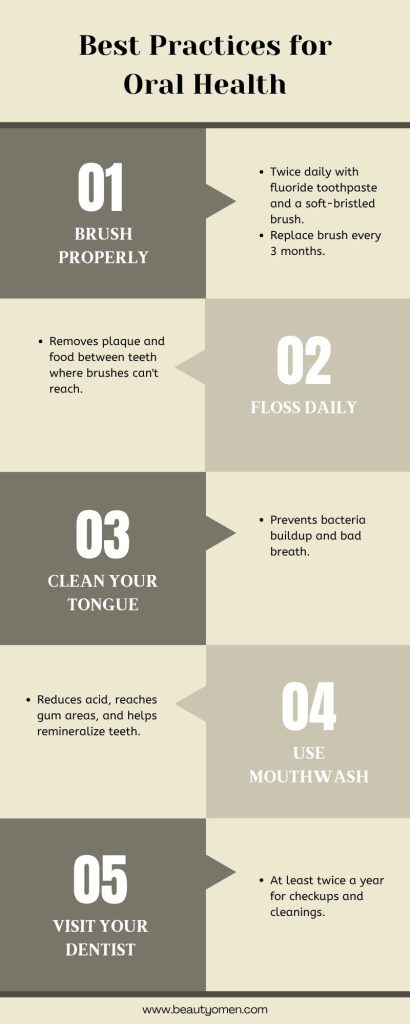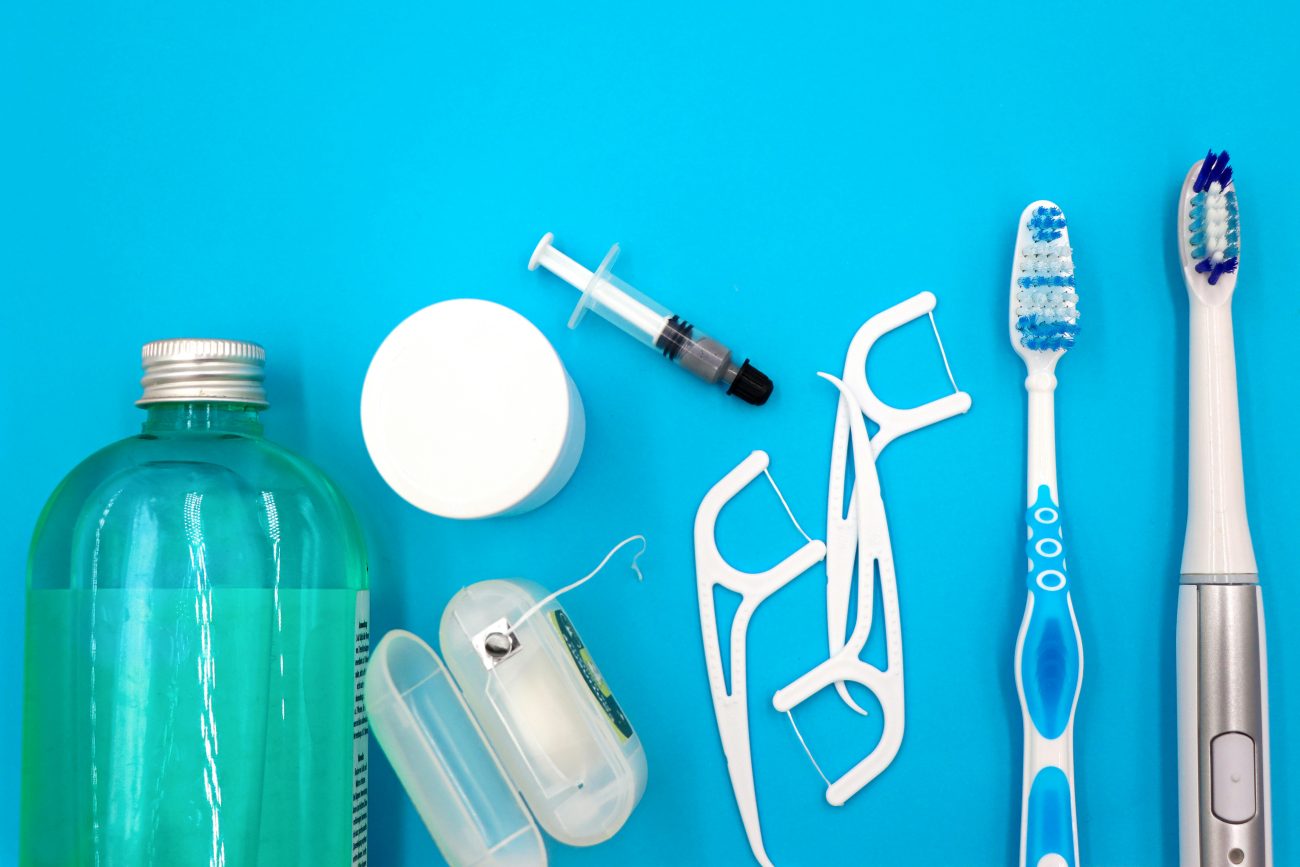Good oral hygiene is vital for overall health and quality of life. While brushing is essential, it’s not enough on its own. Key practices include brushing twice daily with fluoride toothpaste and a soft-bristled brush, flossing to remove debris between teeth, cleaning the tongue, and using mouthwash for extra protection. Regular dental checkups, limiting sugary and acidic foods, eating teeth-whitening fruits and vegetables, staying hydrated with water, and keeping toothbrush holders clean are all crucial habits. Maintaining these routines and visiting the dentist twice a year can ensure long-term oral health.

Oral health is a window to your overall health. What’s happening in your mouth is often a reflection of what’s happening in the rest of your body.
Dr. C. Everett Koop, Former U.S. Surgeon General
How to brush your teeth, which is one of the earliest self-care regimens, you learn from your childhood. Nonetheless, brushing teeth is not the only requirement for your oral hygiene as it may not be enough to prevent bad breath, gingivitis and guard against cavities. Oral hygiene habits play a prime role in your oral health since oral health is the core indicator of your overall health and quality of life.
To maintain an excellent level of oral health, you should ensure great oral hygiene. Protect your entire mouth by following these recommendations given by Dentistry:
1. Brush Properly
As you know, the oral hygiene routine begins with clean teeth. To take care of teeth and prevent problems, we need to take proper oral care every day. So, you regard these brushing basics:
- Brush Teeth Twice a Day: It is a general recommendation that brushing your teeth two times a day. Many do not consider brushing your teeth before bed, even though it gets rid of gingivitis and cavities. You must move the toothbrush in gentle, circular motions to remove plaque. The American Dental Association advised that everyone need to brush for at least two minutes.
- Use Fluoride Toothpaste: You should consider fluoride instead of whitening power and flavors. Fluoride strengthens up developing enamel and makes a protective surface around all your teeth so that they don’t succumb to it. In this process, It prevents dental decay. Fluoride also promotes the remineralization of calcium and phosphate that has leached out of teeth. It also helps to slow the acid production of bacteria caused by plaque. Additionally, it protects teeth against demineralization that happens when the mineral content on your teeth begins to wear away.

- Soft-bristled Toothbrush: Dental professionals recommend a soft-bristled toothbrush that fits your mouth comfortably. They also advise brushing teeth in short back-and-forth motions with gentle pressure and tilting the brush at a 45-degree angle against the gum line. You can also consider an electric or battery-operated toothbrush, which can reduce plaque and gingivitis more than manual brushing.
- Replace your toothbrush: You likely already know you should change your toothbrush or a replacement head for your electric or battery-operated toothbrush every three months — or sooner if the bristles flay.

2. Flossing
Although we often overlook flossing, it removes plaque and food debris from teeth where a toothbrush cannot reach. String floss, flossing picks, or Waterpik are an example of Flossing.
Use of Floss: firstly, break off dental floss about 18 inches (46 centimeters) if using traditional dental floss or tape. For the best result, floss wraps around one finger of each hand next to your thumbs and holds it tightly between your thumbs and forefingers. Floss glides gently up and down with a rubbing motion on both sides of each tooth. When you are flossing, then must be careful as though do not snap the floss on your gums.
3. Clean Tongue
You have to clean your tongue gently every time you brush your teeth due to bacteria that can also build up on your tongue. The grooves of papillae, which means little bumps on the top of the tongue, pile up bacteria, dead skin cells, and food particles. These things cause not only halitosis but also other oral health complications.

4. Use Mouthwash
It will be great if your hygiene session end with mouthwash, which seems essential for good oral health. It reduces the amount of acid in the mouth, cleans hard-to-brush areas in and around the gums, and remineralizes the teeth; nevertheless, most of us ignore it for unknown how to work mouthwash. Additional benefits of mouthwashes are cavity protection and whitening. We must keep in our mind before using mouthwash to console dentists for specific mouthwash recommendations.
5. Visit The Dentist
Dental visits, depending on your everyday habits because it is crucial to our overall oral health. It is necessary to regular dental cleanings and exams to prevent gum disease and other oral health problems. You need to consult your dentist: meanwhile, you notice any symptoms such as you need to consult your dentist: meanwhile, you notice any symptoms such as
- Red, tender or swollen gums
- Gums that bleed when once you brush or floss
- Gums that begin pulling far away from your teeth
- Loose permanent teeth
- Unusual sensitivity to hot and cold
- Persistent halitosis
- Painful chewing
Even if you have excellent oral health habits and no oral health concerns, you should visit your dentist twice a year, once for a regular check-up in a year and another for a cleaning every six months. Above all, you must follow your dental practitioners what they recommend to you.
Some other important factors also involve your oral hygiene. Like that:
1. Limit Sugary and Acidic Foods
It is better to limit the acidic fruits and beverages like soda, sweet tea, or coffee with sugar and cream in your diet since these foods wear down tooth enamel. Additionally, sugar converts into acid, which starts to dissolve the minerals in your teeth. As a consequence, this leads to cavities.
2. Eat Teeth-whitening Foods
You would like to consume fresh, fibrous foods—such as celery, cucumbers, apples, pears, carrots, and lettuce for the enhancement of your oral health. These fruits and vegetables scrub your tooth surfaces and pull out the accumulation of plaque, which makes teeth yellow. Additionally, those foods help neutralize acids that can erode your teeth.
3. Drink More Water
While water Helps Maintain the Balance of Body Fluids, it is the best beverage for overall health — including oral health. It washes out food and debris, which is the reason for acid. The fluoride in the water put together a coating to your teeth, which protects against acid and reverse cavities. So, the dentist recommends drinking water after every meal.
4. Wash Your Toothbrush Holder
The National Sanitation Foundation advises you should wash the toothbrush holders once or twice a week, as toothbrush holders are the third-germiest household item.
Remember, your good oral health is up to a mindful of your daily habits. And also, early detection of oral problems and treatment ensures a lifetime of good oral health.
Final Thought
Maintaining excellent oral health goes beyond just brushing your teeth—it requires a comprehensive daily routine including proper brushing, flossing, tongue cleaning, and regular dental visits. Coupled with mindful dietary choices and good hygiene habits, these practices protect not only your smile but your overall health and quality of life. By staying consistent and attentive to early signs of dental issues, you can ensure a lifetime of healthy teeth and gums.
